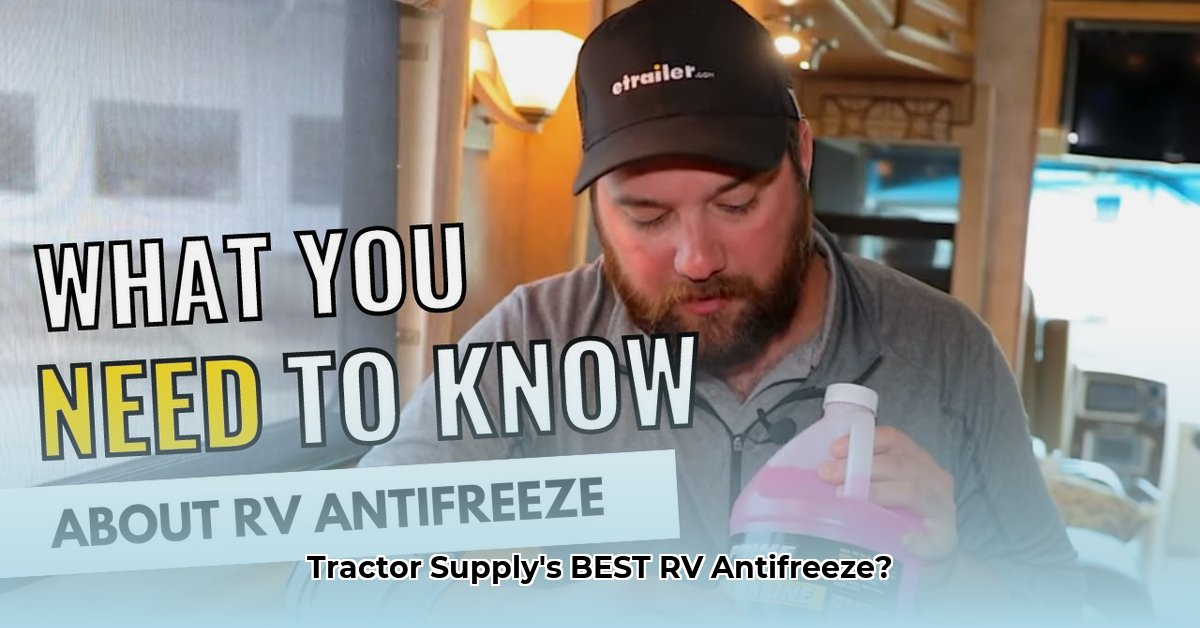
Protecting your RV's plumbing system from freezing temperatures is crucial to preventing costly repairs. Tractor Supply offers a variety of RV antifreeze options, but choosing the right one requires understanding the differences between types and employing proper winterization techniques. This guide provides a comprehensive overview, helping you make informed decisions to safeguard your RV investment. For more information on related fluids, check out this helpful resource on tractor hydraulic oils.
Understanding RV Antifreeze Choices
Two primary types of RV antifreeze are available at Tractor Supply: propylene glycol and ethanol-based. Avoid using ethylene glycol (automotive antifreeze), as it's highly toxic. The table below summarizes their key characteristics:
| Antifreeze Type | Toxicity (Humans & Pets) | Environmental Impact | Cost | Biodegradability | Notes |
|---|---|---|---|---|---|
| Propylene Glycol | Low | Relatively Low | Moderate | High | Safer, longer-lasting; recommended for most climates. |
| Ethanol-Based | Low | Moderate | Lower | Moderate | Flammable; check RV manufacturer compatibility; shorter lifespan |
While propylene glycol might have a slightly higher upfront cost, its longer lifespan and superior protection often make it the more economical choice in the long run. A single costly repair from a frozen pipe can easily outweigh the initial price difference.
Selecting the Best Antifreeze for Your RV
The ideal antifreeze depends on several factors:
- Climate: Colder climates necessitate higher concentrations of antifreeze to prevent freezing.
- RV System: Consult your RV owner's manual for specific compatibility requirements. Some systems may be sensitive to certain antifreeze types.
- Personal Preferences: Prioritize safety and environmental friendliness or cost-effectiveness based on individual needs.
Winterizing Your RV: A Step-by-Step Guide
Proper winterization involves more than just adding antifreeze. Follow these steps for optimal protection:
- Completely Drain Your System: Thoroughly drain all water from your RV's plumbing, including the water heater and low-point drains. (This critical step ensures the antifreeze can effectively protect your pipes).
- Add Antifreeze: Carefully pour the chosen antifreeze into all water inlets, following the manufacturer's instructions for concentration. Use a pump or gravity method to distribute it evenly. Aim for a 95% antifreeze solution in climates with freezing temperatures.
- Flush the System: Run each faucet, showerhead, and toilet until a consistent flow of antifreeze emerges. (This step ensures complete circulation and protection).
- External Faucets & Connections: Winterize external faucets and water connections meticulously, as these components are particularly vulnerable.
- Water Heater: Follow the manufacturer's instructions for winterizing your water heater. This typically involves draining and adding antifreeze to prevent damage.
Responsible Disposal of Used Antifreeze
Improper disposal of RV antifreeze poses significant environmental risks. Never dispose of it down the drain, onto the ground, or in the garbage. Instead:
- Check Local Regulations: Contact your local waste management department or sanitation department to determine the proper disposal method in your area. Regulations vary significantly.
- Designated Drop-Off Locations: Many communities offer designated drop-off points for hazardous waste, including RV antifreeze. These locations may include recycling centers, auto parts stores, or hazardous waste facilities.
Remember, responsible disposal protects our environment and prevents contamination.
Troubleshooting and FAQs
- Leaks: Repair any leaks before winterizing to ensure the antifreeze's effectiveness.
- Concentration: Always follow the manufacturer's recommended concentration levels. Using too little leaves your system vulnerable, whereas too much can damage certain components.
- Forgotten Steps: If you miss a step, rectify the situation as quickly as possible. If immediate correction isn't feasible, closely monitor the system for any issues.
Conclusion
Protecting your RV's plumbing system is essential. Choosing the correct antifreeze from Tractor Supply, coupled with meticulous winterization, safeguards against costly repairs and ensures your RV remains ready for adventures throughout the year. Don't take chances; prioritize proper winterization and environmentally responsible disposal. The long-term benefits far outweigh the initial effort.